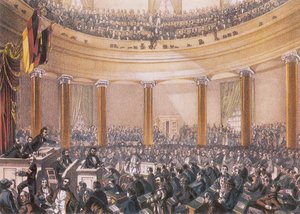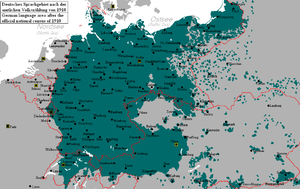- German nationalism
-
 The Reichsadler from the coat of arms of Henry VI dated 1304, Holy Roman Emperor and King of Germany. The Reichsadler, now known as the Bundeswappen, is a symbol of Germany and the German nation.
The Reichsadler from the coat of arms of Henry VI dated 1304, Holy Roman Emperor and King of Germany. The Reichsadler, now known as the Bundeswappen, is a symbol of Germany and the German nation.
German nationalism (German: Deutscher Nationalismus or Deutschnationalismus) refers to the nationalism of Germans or of German culture.[1] The origins of the beginning of a sense of German identity began with the Protestant Reformation begun by Martin Luther that resulted in the spread of a standardized common German language and literature.[1] The concept of nationalism itself was developed by German philosopher Johann Gottfried Herder.[2] Advocacy of a German nation began to become an important political force in response to the invasion of German territories by France under Napoleon.[1] After the rise and fall of Nazi Germany that committed the genocide now known as the Holocaust in the name of extreme nationalism against Jews and others during World War II, German nationalism has been generally viewed in the country as negative and taboo.[3] During the Cold War a mainstream moderate German nationalism arose that supported the unification of East and West Germany that was achieved in 1990.[3]
Contents
History
16th to mid-19th century
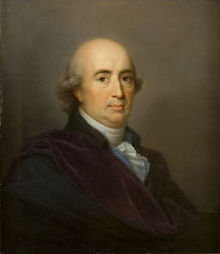 Johann Gottfried Herder, the founder of the concept of nationalism itself and the founder of the original Romantic German nationalism.
Johann Gottfried Herder, the founder of the concept of nationalism itself and the founder of the original Romantic German nationalism.
The Protestant Reformation begun by Martin Luther has been cited as the origins of German identity that arose in response to the spread of a common Germanic language and literature.[1] Early German national culture was developed through literary and religious figures including Luther, Johann Wolfgang von Goethe and Friedrich Schiller.[4] However it was until the concept of nationalism itself was developed by German philosopher Johann Gottfried Herder that German nationalism began.[2] Early German nationalism as promoted by Herder and Immanuel Kant was Romantic in nature that were based upon the principles of collective self-determination, territorial unification and cultural identity, and a political and cultural programme to achieve those ends.[5] The German Romantic nationalism of Herder and Kant derived from the Enlightenment era philosopher Jean Jacques Rousseau's and French Revolutionary philosopher Emmanuel-Joseph Sieyès' ideas of naturalism and that legitimate nations must have been conceived in the state of nature.[6] This emphasis on the naturalness on ethno-linguistic nations continued to be upheld by the early 19th century Romantic German nationalists Johann Gottlieb Fichte, Ernst Moritz Arndt, and Friedrich Ludwig Jahn.[6]
The invasion of the Holy Roman Empire (HRE) by Napoleon's French Empire and the subsequent dissolution of the HRE brought about a German liberal nationalism as advocated primarily by the German middle-class bourgeoisie who advocated the creation of a modern German nation-state based upon liberal democracy, constitutionalism, representation, and popular sovereignty while opposing absolutism.[7] Fichte in particular brought German nationalism forward as a response to the French occupation of German territories in his Address to the German Nation (1808), evoking a sense of German distinctiveness in language, tradition, and literature that composed an common identity.[8]
After the defeat of France in the Napoleonic Wars at the Congress of Vienna, German nationalists sought but failed to establish Germany as a nation-state, instead the German Confederation was created that was a loose collection of independent German states that lacked strong federal institutions.[7] Economic integration between the German states was achieved by the creation of the Zollverein ("Custom Union") of Germany in 1818 that existed until 1866.[7] The move to create the Zollverein was led by Prussia and the Zollverein was dominated by Prussia, causing resentment and tension between Austria and Prussia.[7]
Revolutions of 1848 to German Unification of 1871
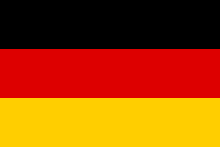 Flag adopted by the Frankfurt Parliament in 1848,, it is the current flag of Germany in a 3:5 size, it is a common symbol of liberal and democratic German nationalism.
Flag adopted by the Frankfurt Parliament in 1848,, it is the current flag of Germany in a 3:5 size, it is a common symbol of liberal and democratic German nationalism.
The Revolutions of 1848 resulted in a liberal nationalist revolution in various German states.[7] Liberal nationalists did not seize power in a number of German states and an all-German parliament was created in Frankfurt in May 1848.[7] The Frankfurt Parliament attempted to create a national constitution for all German states but rivalry between Prussian and Austrian interests resulted in proponents of the parliament advocating a "small German" solution (a monarchical German nation-state without Austria) with the imperial crown of Germany being granted to the King of Prussia.[7] The King of Prussia refused the offer and efforts to create a liberal German nation-state faltered and collapsed.[9]
In the aftermath of the failed attempt to establish a liberal German nation-state, rivalry between Prussia and Austria intensified under the agenda of Prussian Chancellor Otto von Bismarck who blocked all attempts by Austria to join the Zollverein.[10] A division developed amongst German nationalists, with one group led by the Prussians that supported a "Lesser Germany" that excluded Austria and another group that supported a "Greater Germany" that included Austria.[10] The Prussians sought a Lesser Germany to allow Prussia to assert hegemony over Germany that would not be guaranteed in a Greater Germany.[10]
Prussia achieved hegemony over Germany in the "wars of unification": the Second Schleswig War (1864), the Austro-Prussian War (1866), and the Franco-Prussian War (1870).[10] A German nation-state was founded in 1871 called the German Empire as a Lesser Germany with the King of Prussia inheritting the throne of German Emperor (Deutscher Kaiser) and Bismarck becoming Chancellor of Germany.[10]
1871 to World War I, 1914-1918
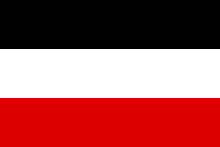 Flag of the North German Confederation (1866-1871) and the German Empire (1871-1918), a common symbol of reactionary and far-right German nationalism.
Flag of the North German Confederation (1866-1871) and the German Empire (1871-1918), a common symbol of reactionary and far-right German nationalism.
Unlike the prior German nationalism of 1848 that was based upon liberal values, the German nationalism utilized by supporters of the German Empire was based upon Prussian authoritarianism, and was conservative, reactionary, anti-Catholic, anti-liberal and anti-socialist in nature.[11] The German Empire's supporters advocated a Germany based upon Prussian and Protestant cultural dominance.[12] This German nationalism focused an German identity based upon the historical crusading Teutonic Order.[13] These nationalists supported a German national identity claimed to be based on Bismarck's ideals that included Teutonic values of willpower, loyalty, honesty, and perseverance.[14]
German nationalists in the German Empire who advocated a Greater Germany during the Bismarck-era focused on overcoming dissidence by Protestant Germans to the inclusion of Catholic Germans in the state by creating the Los von Rom! ("Away from Rome!") movement that advocated assimilation of Catholic Germans to Protestantism.[15] During the time of the German Empire, a third faction of German nationalists developed - especially in Austria - who advocated a Greater Germany but, unlike earlier concepts, led by Prussia instead of Austria; They were known as Alldeutsche.
Social Darwinism, messianism, and racialism began to become themes used by German nationalists after 1871 based on the concepts of Volksgemeinschaft.[16]
An important element of German nationalism promoted by the government of the German Empire was its emphasis on Germany asserting itself as a world economic and military power, aimed at competing with France and the United Kingdom for world power.[3] Eventually this direction led to the onset of World War I.[3]
Interwar period, 1918-1933
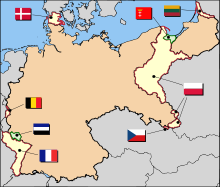
After the defeat of Germany in World War I, Germany faced being forced to accept the punitive conditions of war repratations and territorial losses of the Treaty of Versailles as well as the effects of hyperinflation, economic insecurity, and constitutional weaknesses.[3] Germans were disatisfied with the state of affairs in Germany.[3] New institutions of the new Weimar Republic faced difficulties in mobilizing the masses in favour of its policies. Economic, social, and political cleavages fragmented Germany's society.[3] Eventually the Weimar Republic collapsed under these pressures and the political maneuverings of leading German officials and politicians.[3]
References
- ^ a b c d Motyl 2001, pp. 189.
- ^ a b Motyl 2001, pp. 189-190.
- ^ a b c d e f g h Motyl 2001, pp. 190.
- ^ Kesselman 2009, pp. 180.
- ^ Smith 2010, pp. 24.
- ^ a b Smith 2010, pp. 41.
- ^ a b c d e f g Verheyen 1999, pp. 7.
- ^ Jusdanis 2001, pp. 82-83.
- ^ Verheyen 1999, pp. 7-8.
- ^ a b c d e Verheyen 1999, pp. 8.
- ^ Verheyen 1999, pp. 8, 25.
- ^ Kesselman 2009, pp. 181.
- ^ Samson 2002, pp. 440.
- ^ Gerwarth 2005, pp. 20.
- ^ Seton-Watson 1977, pp. 98.
- ^ Verheyen 1999, pp. 24.
Bibliography
- Gerwarth, Robert (2005). The Bismarck myth: Weimar Germany and the legacy of the Iron Chancellor. Oxford, England, UK: Oxford University Press. ISBN 019928184X.
- Jusdanis, Gregory (2001). The Necessary Nation. Princeton, New Jersey, USA: Princeton University Press. ISBN 0691089027.
- Kesselman, Mark (2009). European Politics in Transition. Boston, Massachusetts, USA: Houghton Mifflin Company. ISBN 0618870784.
- Motyl, Alexander J. (2001). Encyclopedia of Nationalism, Volume II. Academic Press. ISBN 0122272307.
- Samson, James (2002). The Cambridge History of Nineteenth-Century Music. Cambridge, England, UK: Cambridge University Press. ISBN 0521590175.
- Smith, Anthony D. (2010). Nationalism. Cambridge, England, UK; Malden, Massachusetts, USA: Polity Press. ISBN 0192892606.
- Seton-Watson, Hugh (1977). Nations and states: an enquiry into the origins of nations and the politics of nationalism. London, England, UK: Methuen & Co. Ltd.. ISBN 0416768105.
- Verheyen, Dirk (1999). The German question: A Cultural, Historical, and Geopolitical Exploration. Cambridge, England, UK; Malden, Massachusetts, USA: Westview Press. ISBN 0813368782.
See also
- Germans
- German culture
- Germany
- Deutschtum
- Frankfurt Parliament
- German unification
- Völkisch movement
- Nazi Party
- Nazism
- Nazi Germany
Categories:- Nationalism by country or region
- History of Europe
- History of Germany
- German culture
Wikimedia Foundation. 2010.

